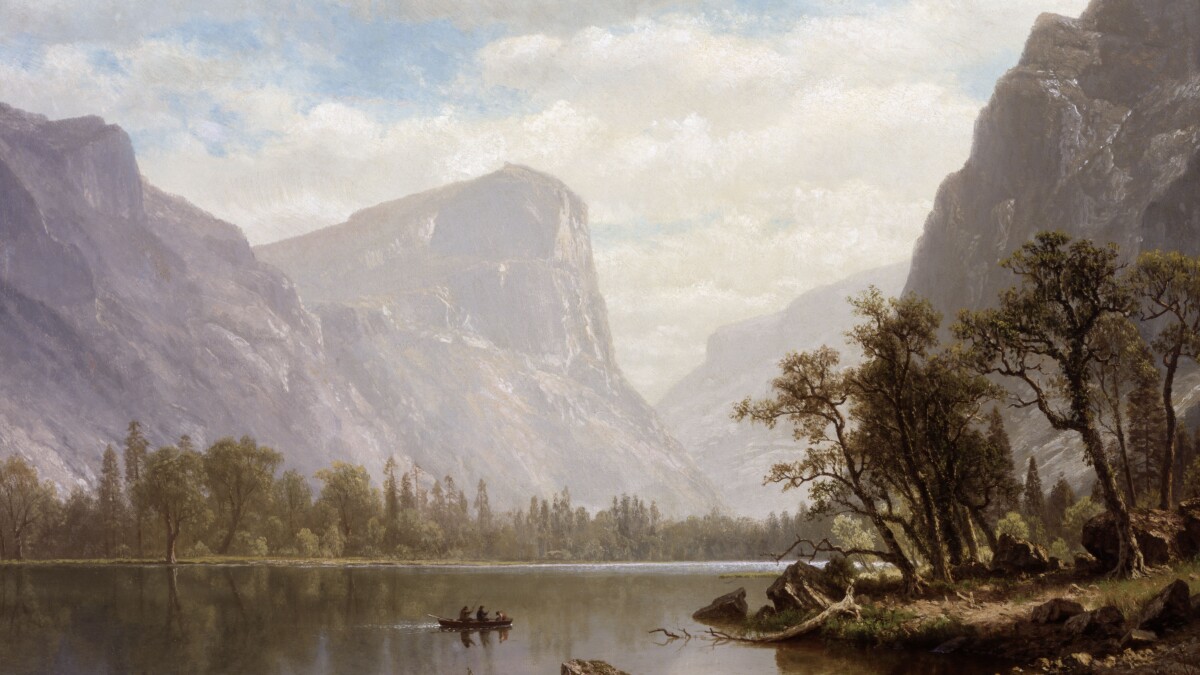Wonder and Awe
 Mirror Lake, Yosemite Valley, 1864 by Albert Bierstadt
Mirror Lake, Yosemite Valley, 1864 by Albert Bierstadt
Wonder
Though it defies true definition, we all recognise wonder. Wonder is when we admire something new or unfamiliar and are astonished by it. Typically, wonder as a human emotion is rare; this is because the primary ingredient of wonder is novelty.
Novelty is anything new and therefore unfamiliar to your human experience. Think of experiences in your life which have precipitated wonder; maybe it was seeing snow for the first time or snorkelling in a coral reef. In each possible instance, these experiences of wonder are inevitably driven by novelty.
Because the novel is unfamiliar, this usually means that you initially don't understand it. It's for this reason that wonder tends to be accompanied by an underlying curiosity1Ironically, the mental mechanism behind wonder is intrinsic within the word itself, that is, whenever you say something along the lines of: "I wonder what that is?". The height of novelty and therefore wonder will be when you experience something for the very first time. As you begin to experience it further, it's novelty will fade, progressively replacing wonder with apathy. This explains why children live their lives in an almost constant state of wonder, while adults, having experienced almost all there is to experience, very rarely encounter it at all.
When we find wonder in the mundane — an ant crawling across a leaf, a raindrop sliding down a windowsill — this is recapturing, just for a fleeting moment, the feeling we felt when we experienced it's novelty for the very first time. This process is the essence of what it means to 'cultivate wonder'.
Let me note for the record that not all novelty produces wonder. If you eat an exotic looking boiled substance and find it utterly disgusting, then you most certainly aren't going to experience wonder — you are going to experience disgust. While there isn't a direct causation between all novelty and wonder, wonder does undeniably rely on novelty as the primary ingredient. The thing is, it's quite difficult to pre-empt whether something novel will yield wonder. So, in order to find those experiences, inevitably you're going to have to try new things.
The flipside to trying new things is that we usually have to endure a small measure of discomfort. All of us as humans find comfort in the familiar, the things which stay the same in our lives — our house, our job, our family, our friends, our routine. Discomfort is inherent within novelty because by definition, that which is novel is unfamiliar to our human experience. By extending our horizons beyond what is familiar and therefore comfortable, we risk awkwardness, disgust, disappointment... in a work, discomfort.
And yet, if discomfort is inherent within novelty2Again, not a causation, merely a correlation, then discomfort is imperitive to experiencing wonder. However, all things considered, discomfort is a relatively small price to pay in order to find wonder. And, when you do end up finding and experiencing it, in the midst of wonder there exists no room for discomfort. In fact, in the moment itself, wonder trumps all other emotions, thoughts and feelings. Wonder truly is a wonder.
Awe
Similar, but very different to wonder is the feeling of awe. Awe is when we are met by some breathtaking experience which commands a mixture of fear, reverence and amazement.
In the same way that wonder relies on novelty, awe relies on grandeur. Grandeur is the quality of greatness, whether in size, in scope, in detail... anything which captures something greater than your mind has yet imagined. Again, think of experiences in your life which have precipitated awe; maybe it was meeting a powerful figure whom you revere or appreciating a mind-bendingly epic cloud formation. In each possible instance, these experiences of awe are inevitably driven by grandeur.
Physiologically, the best way to identify awe is to determine whether the experience is accompanied by goosebumps. Goosebumps are a sure sign that whatever you are perceiving, you perceive to be as beyond the ordinary. Another more psychological sign of awe is that while wonder may cause us to ask questions, awe tends to strike us dumb. That's because we are dumbfounded... but only for a moment.
This capturing of emotion and feeling in a single moment is true for wonder also. In this way, wonder and awe are less feelings than they are experiences, experiences which occur powerfully and unpredictably.
When Wonder Meets Awe
Now while some experiences of awe can contain elements of wonder (and vis versa), a true melding of wonder and awe creates something far greater than the sum of its parts, something which surpasses understanding. For a second your mind opens, your breath catches, your thoughts transcend... A moment builds and cascades into something truly beyond description. The English language doesn't quite have a word which encapsulates that tentative place made up of equal parts awe and wonder (wond-awe?).
The best way to describe this phenomenon is as an experience which so complex and multifaceted that you don't exactly know what you're feeling, you just feel. More specifically, it takes the physiological and psychological effects of awe and combines them with the novelty and astonishing nature of wonder, both dialed up to a level which is nigh on overwelming.
While awe strikes us dumb for the primary reason that we are awe-struck, wond-awe strikes us down due to the inexpressibility of both the stimulus and our subsequent state. Because this inexpressibly unique experience is greater than the sum of its parts, for this reason it doesn't merely come from something which merely contains both grandeur and novelty... Instead it relies on the sublime.
The sublime is a kind of grandeur, but a grandeur which is beyond any form of human understanding, thus linking it to the novel. Through this definition, there emerges a few contexts which the sublime can arise in.
Firstly, the infinite. Now the infinite is all around us — infinite smallness, infinite largeness and an infinity in between. The trick to experiencing this combination of awe and wonder is to somehow catch a glimpse of it. This can occur when we mistake the quantity of greatness for the quantity of infinite greatness — for example, seeing a boundless landscape as truly boundless.
Another context which is able to produce the sublime is the indefinite. Just as what is definite is linked to reality, by the same logic, what is indefinite is linked to that which is beyond reality. Specifically what I'm referring to here is an abstracted, aesthetic experience... in other words, art. For example, words as art are able to capture a quality which only exists in the human mind; something which truly does transcend reality.
In Pursuit of Wonder and Awe
Slowly but surely I've attempted to describe wonder, awe and a unique but recognisable combination of the two. Though each of these are positive experiences which we could all do with more of, the inevitable question remains: How can you go about experiencing them?
The thing is, I could list off a handful of circumstances which produced these emotions for me, but by no means would they do the same for you. What is novel or grand to one person may be boring and mundane to another. To find these experiences, you're going to have to actually look for them yourself, based off your own personal experiences. This being said, there is one technique which is undoubtably able to produce wonder and awe in everyone:
Travel.
By travelling overseas and encountering a completely unfamiliar culture and environment, it is basically inevitable that you will experience both awe and wonder in gloriously gluttonous abundance.
To hear a different language, eat a different cuisine, see sights which you could never other wise see — all of these are able to produce a novelty and grandeur which is simply inaccessible in your home country.
That's because, by living somewhere, we naturally exhaust the natural wonder and awe which we find there.
So, by travelling outside of what we know — to Japan , to Italy, to Brazil, where-ever it may be — we are able to find new sources of wonder and awe.
, to Italy, to Brazil, where-ever it may be — we are able to find new sources of wonder and awe.
Now I fully realise that this reflection will be inconsequential to most. Although we can all appreciate wonder and awe, most people probably don't care enough about them to actively seek them out. With this in mind, I at least hope that this article will be able to cultivate a greater self awareness regarding these experiences. And, if you truly can't remember the last time you felt unrestrained wonder or breathtaking awe, the least you can do is wonder...
He who wonders discovers that this in itself is a wonder — M.C. Escher
← Specialisation in Generalisation Travelling Japan →
